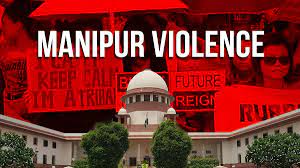The Court asked the President of the Manipur High Court Bar Association to prepare a statement and submit orders of the High Court showing that lawyers from all communities appeared.
The Supreme Court on Monday directed the President of the Manipur High Court Bar Association to confirm that lawyers were not being prevented from appearing before the High Court based on religious or other affiliations.
A Bench of Chief Justice of India (CJI) DY Chandrachud with Justices JB Pardiwala and Manoj Misra instructed the President to prepare a statement and submit orders of the High Court showing that lawyers from all communities appeared.
"Prepare a tabulated statement with order, dates and who were the lawyers who appeared…showing all community lawyers appeared. You can give us a bunch of orders also to show that members of bar are not being prevented to appear based on religious or any other affiliations," the Court directed.
CJI Chandrachud also made it clear that the Supreme Court does not aim to delve into every detail of administration of the State.
He said,
"We do not propose to run the Manipur administration in the Supreme Court. We will not hear the case every week, we will hear it every four weeks. We do not believe the High Court of Manipur is not functioning."
The Bench made these observations in response to submissions that lawyers were not being allowed to appear before the High Court to espouse causes related to the violence in the State. While Senior Advocate Colin Gonsalves said he wasn't allowed to appear on two occasions, the President of the High Court Bar Association insisted that lawyers from all communities were appearing in matters.
The Court was hearing a batch of pleas related to the ongoing outbreak of violence in Manipur.
The Central government had recently ordered a probe by the Central Bureau of Investigation (CBI) into the viral video of women being paraded naked, after the bench had taken it up suo motu.
During the hearing of the matter on August 1, the Court had castigated the authorities and the State Police over their apparent failure to control the law and order situation that unfolded in Manipur.
It thus constituted an all-woman judicial committee headed by Justice (retired) Gita Mittal to examine the probe being conducted into the violence.
The committee has been tasked with examining the ongoing probes and suggesting remedial measures, compensation and rehabilitation, among other things. Among other suggestions, it had suggested that the compensation to be paid to victims of violence should be enhanced.
During the hearing today, Gonsalves informed the Bench that the ninth report of the committee on the situation had been submitted. He discussed the progress made in terms of rehabilitation, with both the Central and State governments cooperating in following the committee's directions.
The issue of reissuing Aadhaar cards to displaced persons was raised. The CJI expressed concern over illegal entrants and emphasized the importance of verification. Accordingly, the Bench directed that Aadhaar cards should be provided to all displaced persons whose records are available with the Unique Identification Authority of India (UIDAI) after verification.
Biometrics of individuals with existing Aadhaar cards would simplify the process, the Bench noted. The issue of some Aadhaar cardholders possibly being illegal immigrants was raised, but the CJI reiterated that verification would take place.
Furthermore, the Court directed the Health Secretary of Manipur to issue duplicate disability certifications for individuals who had missed out during the displacement period.
The Court also instructed the government of Manipur to ensure adequate disbursement of funds under the Manipur Victim Compensation Scheme.
Solicitor General (SG) Tushar Mehta expressed concerns regarding the Court's involvement in administrative matters, suggesting that such issues could be resolved through cooperation between the committee and the government.
The CJI clarified that the Court would issue directions as necessary, with any additional matters to be addressed at the governmental level.
Gonsalves also mentioned the reconstruction of churches and the need for identifying deceased individuals and their next of kin for ex gratia payments.
The CJI noted that there often existed a gap between court orders and on-ground implementation.
Consequently, it directed both the Central and State governments to respond to the ninth report submitted by the committee.
